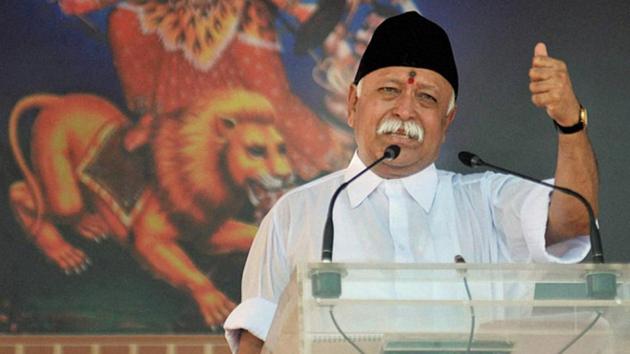Ayodhya verdict: How RSS prepared for Supreme Court judgment
The Sangh, which is the ideological fountainhead of the ruling Bharatiya Janata Party, welcomed the SC’s verdict on Saturday to hand over the disputed land in Ayodhya to the Hindus.
The Rashtriya Swayamsevak Sangh (RSS) planned a Muslim outreach months ahead of the Supreme Court (SC)’s verdict on the Ram Janmabhoomi-Babri Masjid title suit to avert a repeat of violent protests during the April 2, 2018, Bharat Bandh, and also as part of attempts to shed its anti-Muslim image, according to three people aware of the developments.

The Sangh, which is the ideological fountainhead of the ruling Bharatiya Janata Party, welcomed the SC’s verdict on Saturday to hand over the disputed land in Ayodhya to the Hindus. But it chose to temper down the celebrations. The RSS has conveyed a message to its cadres to refrain from “ostentatious celebrations” and to maintain peace as part of attempts to assuage concerns of the minorities and prevent communal flare-ups, the functionaries said.
“The Sangh reached out to the Muslims through its senior leadership, underlining how it believes in peace and not exclusion or otherness,” one of the functionaries cited above said on condition of anonymity.
The Sangh widened its outreach even as its critics accused it of tacit support to self-styled cow vigilantes, who have been accused of lynching members from the Muslim community in states like Rajasthan. In September, RSS chief Mohan Bhagwat met Jamiat Ulama-i-Hind (JUH) president, Arshad Madani, to ensure peace and harmony is maintained. JUH is a leading organisation of Muslim scholars.
Another RSS functionary said that the Sangh decided to engage with a cross-section of community leaders to “avoid the repeat” of the violent protests during the Bharat Bandh.
Nine people were killed during the Bandh, which Dalit organisations had called against the Supreme Court’s dilution of provisions like automatic arrests under the Scheduled Castes and Scheduled Tribes (Prevention of Atrocities) Act in March 2018. The stringent provisions of the law were later reintroduced through legislation.
“During the Bharat Bandh protests, we noticed that the instigation took place from outside [India]. It was a contrived protest, which was limited to the BJP-ruled states only. Anticipating that a similar attempt can be made in the wake of the Supreme Court’s judgment, we decided to engage with the community leaders to assure them that the case is not a Hindu-Muslim issue,” said the second functionary on condition of anonymity.
Sangh leaders travelled across the country to meet prominent Muslims leaders, professionals, academicians and members of the civil society to underline the need for maintaining peace, the functionaries said.
An attempt was also made to win over the Muslims by portraying Mughal emperor Babur, who is blamed for ordering the demolition of the Ram Temple in Ayodhya, as an invader and not the one they trace their lineage to, they added. The Muslims were also urged to follow Dara Shikoh a “good Muslim, who kept trying to be a good Indian” and not his brother and Mughal emperor, Aurangzeb, a “tyrant, and a bigot”, the functionaries said.
“It is not a Hindu-Muslim or a temple-mosque issue as it is made out to be. This is a fight to overturn a wrong. There was a temple that Babur’s general Mir Baqi demolished [to build a mosque]. This fight is to reclaim that sacred space and not a fight against the Indian Muslims,” said the second functionary.
The Sangh has also instructed its cadres against raising the issue of reclaiming temples in Mathura and Kashi at a time when tempers are already frayed. This comes even as it been pushing the Centre to bring a law for population control and raising concerns about demographic changes, which its opponents see as examples of its anti-Muslim stance.
A third RSS functionary said that the Sangh’s Muslim outreach is not new and the allegation that it is anti-minorities stems from the political opposition. He cited former RSS chief K Sudarshan’s meetings with several leaders from Muslim and Christian communities.
In 2009, Sudarshan met Shia Muslim cleric Hamidul Hasan amid a controversy over the singing of Vande Mataram. A few years later, he also met Kalbe Sadiq, the then vice-president of All India Muslim Personal Law Board, the third functionary said.
RSS leader Krishna Gopal on Friday met a group of Muslims in New Delhi and is learned to have told them that this is for the first time that a conversation is taking place between the Hindus and the Muslims after nearly 800 years.
Gopal told the gathering that whether any political party needs them or not, the country needs the Muslims. “These interactions are like preventive medicine. We decided to reach out to people and ensure harmony and peace are not shattered,” the second functionary said.






